- Home
- J. Clifton Slater
Fatal Obligation Page 18
Fatal Obligation Read online
Page 18
***
Alerio didn’t need anyone to tell him the first port of call in the Gulf of Corinth was a naval station. Six triremes and eight ocean patrol boats occupied the beach.
When the new crew member went to roll the foresail, Alerio stepped onto the steering platform.
“What harbor is this?” he inquired.
“This is Nafpaktos and the warships are Aetolian,” Peri whispered.
But the new sailor noticed the exchange.
“Giving our enemy details for their invasions,” he called down the length of the vessel.
Eidos, Neos, and Zoon looked from the new man to Peri and back.
“Themistocles. Our passenger was asking when we would arrive in Sicyon,” Peri called back.
“Tell the Latian none too soon,” Themistocles scowled. Then Neos said something to him and the two men began unrolling the foresail.
“I’ll leave you to your duties, Captain Crypto,” Alerio informed Peri.
They rowed to the beach and after off-loading steel ingots and cloth, the crew set up camp on the beach. Alerio started a separate campfire and ate alone.
“Come Zoon. Let’s me help you with your treatment,” Eidos instructed.
Zoon crawled around the fire and laid down on his side. Eidos held the porcelain container over his ear about to pour in the drops.
Themistocles leaped over the flames and smacked the vase out of the sailor’s hand.
“What are you doing?” he demanded.
The container flew over the beach. Landing, it tumbled, spilling the liquid and picking up sand before coming to rest near Alerio.
“It’s no wonder Zoon is moros. You’re pouring a liquid into his brain.”
Eidos raised a hand and Neos came to a crouch. For a moment, it seemed the cousins would attack him.
“Themistocles. Your uncle may own the transport,” Peri growled. “but the health of the crew is my business.”
“Everyone knows the ear is a channel to the brain,” offered Themistocles.
“The expensive medicine you dumped into the sand was prescribed by Physician Pyxis of Igoumenitsa,” Peri countered. “Now we have no treatment for Zoon.”
“If a crewman is ill and can’t work, put him on the beach and get another sailor,” Themistocles exclaimed. “There is no room for a nonpaying passenger on a working boat.”
“Perhaps I should resign. You can write to your uncle and tell him to hire another Captain for his transport,” shot back Peri.
“Now Crypto, don’t be hasty,” pleaded Themistocles.
While they talked, Neos walked over and bent to retrieve the container.
“Get me some white vinegar,” Alerio mumbled under his breath. “I’ll prepare more potion.”
Neos nodded his understanding. Then he snatched the porcelain from the sand and stomped back to the other campfire.
“Come on Eidos. Let our betters’ sort this out,” he suggested. “I need some air and wine.”
Eidos gave a passing glance at the wineskin laying by the cooking pot. Standing, he stretched and indicated a path off the beach. The cousins walked away without another word.
***
After the sunset, a small container and the porcelain vase were placed beside Alerio. Once the crew settled down for the night, the Legionary pulled a length of silk bandage from his bundle. In the moonlight, he strained the vinegar through the material. When Eidos woke, he found the full porcelain medicine vase by his head. Zoon would not go another day without his treatment.
The Thalássio Klouví delayed launching until three of the triremes and two patrol boats shoved off. Then, Zoon lifted the anchor and Neos shoved the transport off the sand.
“You can’t see it from here, Sisera,” Peri advised. “but off our starboard side is Sicyon.”
“What’s the next stop?” inquired Alerio.
“The port of Kirra, Latian,” Themistocles answered. “The gateway to Delphi, the Temple of Apollo, and the Oracle of Apollo.”
“I’d like to see that,” remarked Alerio.
“To secure an audience with the oracle, you must be an important man and in possession of wealth,” Themistocles declared. “Like me, a priest of Apollo.”
Alerio saw Eidos and Neos hide their faces in the crooks of their arms.
“Stand by the oars,” Crypto instructed.
***
As the gateway to Delphi, Alerio expected to see a magnificent city or at least a well-ordered town. Kirra was neither impressive or logically laid out. Set back from the beach, the buildings were positioned along wide, winding streets; almost as if designed to hamper the flow of traffic rather than facilitate the movement of people and carts. Further restricting passage, vendor carts lined the center of the roads.
“I shall not be going with you, Peri,” Themistocles stated as he dropped a finely stitched robe over his head. It glowed pure white in the afternoon light and the gold trim reflected the sun when he smoothed out the wrinkles. “My life is now dedicated to the God Apollo.”
“Does your uncle know about this?” inquired Peri.
“My uncle knows only business. He won’t understand the call to serve.”
“Like your call last year to be a royal tutor in Egypt?” questioned Peri. “Or the whim to study philosophy three years ago?”
“Both experiences lead me down the path to enlightenment,” explained Themistocles.
While Eidos and Zoon pulled boards off the cargo hold, the novice priest marched off the Thalássio Klouví with a hand raised blessing everyone on the beach.
“Sisera. Do you feel like helping?” inquired Peri. “If you do, I’ll tell you about Kirra.”
“How could I refuse an offer like that?” Alerio replied.
He grabbed a hook pole and paired up with Neos. Soon the boards were stacked on the sides of the deck and the crew lined the rail waiting for orders from the beach. At the bottom of the ramp, Peri discussed trade with a man in a plain robe. Directly behind the man was an armed and armored bodyguard with his helmet swiveling. Then Alerio noticed Eidos and Neos wore their sicas and Zoon’s club rested against the ship’s rail.
When Alerio professed an interest in helping to unload in exchange for information about the port, he’d been teasing. Apparently, it was the correct choice. Kirra, the gateway to the Temple of Apollo, didn’t seem to be pious or hallowed ground.
***
The cargo had been off-loaded and olives and olive oil loaded. When the final plank was set into the deck, Alerio, Zoon, Neos, and Eidos crowded around Crypto to hear about the port town.
“Kirra was once a powerful city,” Peri explained. “At the end of the First Sacred War, Cleisthenes of Sicyon ordered the Pleistos River poisoned. When the town full of sick people surrendered, Cleisthenes had the walls torn down, the people sold into slavery, and the land cursed.”
“But we just loaded amphorae filled with the fruit of the olive tree,” Neos commented.
“The Sacred Plain of Apollo supports the trees but little else,” Peri responded. “Even along the Pleistos river, the soil is too poor for other crops. Although the walls of Kirra are gone, you can see lines of stones sticking out of the water. Those were once boat docks for a busy shipyard. Now, they help protect the beach from the winds and tides.”
“None of that explains the Trade Master requiring an armed guard,” Alerio pointed out.
“Many wars have been fought over Apollo’s lands and temple,” Peri replied. “In the most recent, King Brennus of the Gauls marched through the mountains intent on looting the temple and the Oracle of Apollo’s domain. He was unstoppable and victorious until reaching the hills above Delphi. There, King Brennus’ army clashed with the Aetolians. Known as good fighters but barbarian in their ways, the mountain tribes of Aetolian were looked down on by other more cultured Greek city-states. After days of fierce fighting, they pushed the Gauls back into the mountains. Once in their natural environment, the Aetolians savaged the enemy even woundin
g Brennus. Whether it was shame at the defeat or fear of capture by the Greek barbarians, the King of the Gauls committed suicide. Since that day, the Aetolian League has been the defenders of Delphi and Kirra.”
“And the odd layout of the town and the armed guard?” Alerio asked.
“The Aetolians are a mountain people. Besides their naval base at Nafpaktos, and some trade, they are self-sufficient and consider Kirra little more than a barricade against an attack on Delphi from the sea,” Peri explained. “They pay little attention to the people who settle in the town. Unfortunately, pilgrims passing through to the temple and the oracle are preyed upon by conmen and thieves. The rich and powerful arrive with armed escorts. All the others take their lives and possessions into their own hands when passing through. In short, Kirra may be the most dangerous community in the world.”
“Are there no redeeming qualities to Kirra?” inquired Eidos.
“Well, the Aetolians mistrust and guard against most of the other Greek cities. So Kirra is safe from attack,” Peri teased. “Except for Sicyon. People have long memories. The threat of Cleisthenes of Sicyon’s spirit poisoning their wells is still used to scare children into behaving. For Sicyon, they reserve a more passionate emotion.”
“What emotion?” Alerio asked.
“They hate Sicyon,” Peri informed him. Then to the entire crew, Crypto ordered. “I want at least one man on watch all night. I don’t fancy having my throat cut while I’m sleeping.”
***
In the middle of the night, a fist rapping on the side of the transport alerted the Legionary to a presence on the beach. Alerio heard the soft sounds and held the lantern over the side. Below, on the edge of the water and leaning against the hull, he saw a naked man resting his head against the wood.
“Crypto. You should see this,” Alerio suggested as he shook the Captain awake.
“See what?” Peri questioned. He tossed back his blanket and climbed to his feet.
When the Captain and Alerio arrived at the rail, Peri took the lantern, leaned over the side, and studied the bare, kneeling man.
“State your business?” Peri demanded.
Themistocles raised a bloody face and held out an arm.
“Help me,” he begged.
“Eidos, Zoon, Neos. Wake up, get up, and lend a hand,” Crypto ordered.
Alerio and the crew dropped the ramp, walked to the sand, and carried the owner’s nephew to the deck. Then they hauled the ramp back on board.
“What happened?” inquired Peri once Themistocles was wrapped in blankets.
“I saw poor street urchins and went over to bless them and assure them of Apollo’s love,” the beaten man described. “One of them punched me and when I doubled over, they attacked.”
“Let me guess. They took your coins and your robe?” offered Peri.
“And his sandals,” Neos mumbled. “It’s a shame, those were nice footwear.”
“Why didn’t you go to Delphi?” Peri questioned ignoring the crewman’s comment.
“Without a donation, I dared not introduce myself to the Priests of Apollo.”
“But you came back to the Thalássio Klouví. Well, I haven’t room for a nonpaying passenger,” Peri informed him. “I’ll just put you off on the beach with a change of clothing, and get on with business.”
“But you can’t do that,” Themistocles pleaded. “You wouldn’t do that.”
“In your own words, if a crewman is ill and can’t work, put him on the beach and get another sailor,” Peri reminded him. “Rest for now. At sunrise, Zoon will assist you down the ramp.”
Themistocles pulled the blanket up and covered his swollen face. The crew heard sobs of helplessness as they walked away.
“Arrogant men fall hard,” Eidos whispered.
“And fools lose nice sandals,” his cousin added as they settled down in their bedding.
Alerio continued to walk the deck, his stretch at lookout not over, yet.
Chapter 29 – The Port of Sicyon
Peri guided the transport around and through clusters of fishing boats. From the deck, Alerio saw the Plain of Apollo and orchards of olive trees behind Kirra. Then the landscape slipped into vagueness. The boat sailed parallel to high ground. Rising sharply from the waters of the Gulf, the base of the mountain vanished directly into the water with no beach.
“That’s Makria Mallia off our port,” Peri offered. “We’ll angle south and the next land you’ll see, Sisera, is Likoporia.”
Alerio watched as Crypto lined up the Thalássio Klouví on stone features and guided the transport away from the high rocky point. Standing behind the Captain, Alerio eyed the points Peri used to navigate.
“How far from Likoporia,” Alerio asked.
“Seventeen miles down the coast and we’ll drop you at the port of Sicyon.”
“Aren’t you docking at Sicyon to trade?”
“No Sisera. I leave the transportation of art to my competitors,” Peri explained. “Paintings are delicate. Add water and you have colored mud. And statues take up too much cargo space. Plus, they require extra care when the crew loads and unloads them. Break off an arm or a head and the whole thing becomes just a piece of pretty granite. And, the bronze work and wood carvings don’t bring much in trade.”
“I’m going to give Zoon his medicine,” Alerio announced.
“Let him finish washing the blood off Themistocles,” urged Peri. Then the Captain sighed and offered. “Maybe I should have put him ashore.”
“But you didn’t,” Alerio observed. “Because he is the owner’s nephew?”
“No. Because he is a beaten and coinless man,” Crypto explained. “Now I get to work him as a basic sailor to pay for his passage. Hopefully, he’ll learn manners, usable skills, and some humility during the voyage.”
“The best stage to teach is when an exhausted Legionary is face down in the mud,” Alerio related. “It’s when they’ll listen without interrupting and take in the lesson without resisting it.”
“There’s no mud available,” Crypto replied. “But my deck planks are looking dry. I think they could use some oil rubbed into the wood.”
While they talked, the visible landmarks and the fishing boats bobbing in the low swells faded in the distance. Makria Mallia became a hazy feature lost in the backdrop of a mountain range. The north shore of the Gulf of Corinth slipped away as the transport headed south.
***
Trading vessels and warships guarding against pirates crisscrossed the Gulf. Those passing close to the Thalássio Klouví hailed Peri. Others sailed or rowed further away. All the ships moving goods between the city-states, around the Gulf and out to ports along the Ionian Sea, gave Alerio an idea of the sea power and shipping prowess of the Greeks.
The sun had yet to reach midday when the southern mountains transformed. From blurred shapes against the sky with the horizon underlining them, trees filling in between sections of bare rock came into focus. As they neared the coast, Alerio noted the number of fishing boats along the shoreline. Some were dinghies with one or two fishermen while others were larger boats carrying crews and heaps of nets. Peri guided the transport along the coast staying far out to avoid most of the fishing boats.
“That is some hard land,” Alerio commented as the transport sailed down the shoreline. “Except for a thin strip near the beach and a few fertile vales, it’s mostly rock.”
“We Greeks farm where we can and trade for what we can’t grow,” Peri informed him. “The water gives us access to everything we need.”
“And the mountains make your people strong?”
“Unfortunately, the limited resources make our leaders jealous of their neighbors,” Peri added. “They waste that strength in wars against each other.”
“It’s the same in the Republic. Influential men of means always want one thing...”
“More power,” Peri stated finishing Alerio’s thought.
***
The mountains began terracing down as
if a giant had carved steps in the rocks. On the last wide tier, walls of a city crowned the heights. Farmland and orchards covered the soil from the foot of the plateau to the coastline two miles away.
“Sicyon,” Peri announced. “Themistocles. Get up and help roll the mainsails.”
The injured man hobbled to the mast and leaned on it for a moment. Then Eidos poked him in the arm and they began rolling the cloth.
The Thalássio Klouví nosed onto the beach and Zoon leaped from the deck. Holding up his arms, the sailor waited to catch Alerio’s bundle and saddlebags before the Legionary jumped to the sand.
“Thank you, Zoon,” Alerio said taking the bundle and the heavy satchel.
“No,” the sailor replied. “Thank you. Yes?”
“I understand,” Alerio offered.
The sailor shuffled to the bow of the transport, flexed his knees, and pushed the boat off the beach. Then he scrambled up and over the rail to the deck.
Alerio stood in the sand as the ship turned. Three steady rowers and, one stumbling at his oar, powered the ship away from the harbor. When the sails unrolled, Peri looked back briefly and waved. Alerio returned the wave with a salute. Then he shifted his baggage to settle it on his shoulders. Once comfortable, Alerio marched down the beach to the docks and elevated walkways.
***
Warships and a few transports were docked at piers. On the other side of the port facilities, fishing boats dotted the sand. Spotting the main exit for the port, Alerio strolled towards the higher ground.
Between two warehouses, he located a road that ran straight through the orchards to a military fort. Beyond the stronghold, the road traveled to the base of the hill before beginning to curve back and forth as it climbed to the gates of Sicyon. Alerio stepped from between the buildings and into the wooden shaft of a spear.
“Sailors are encouraged to stay in the village or the town of Kiato today,” a soldier advised.
To Alerio’s right, he spotted the village. It was a collection of weather-beaten huts and small buildings constructed on rocky, sandy soil. They didn’t look inviting. Far down the beach, horses munched on grass behind fencing. Alerio could only see part of the horse farm’s Villa. The rest was hidden behind a cliff.

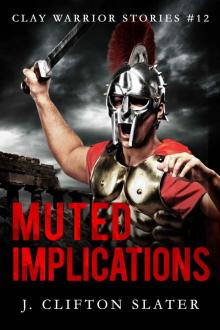 Muted Implications (Clay Warrior Stories Book 12)
Muted Implications (Clay Warrior Stories Book 12)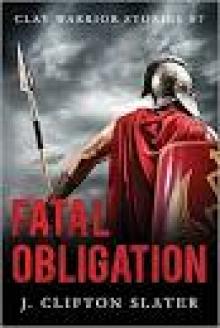 Fatal Obligation
Fatal Obligation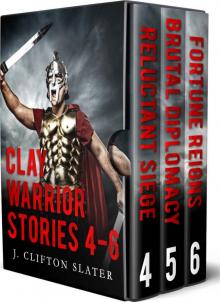 Clay Warrior Stories Boxset 2
Clay Warrior Stories Boxset 2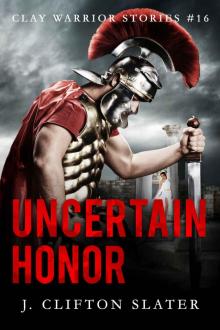 Uncertain Honor
Uncertain Honor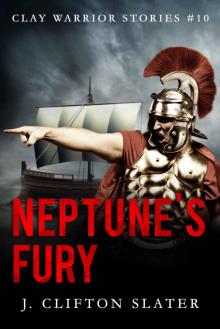 Neptune's Fury
Neptune's Fury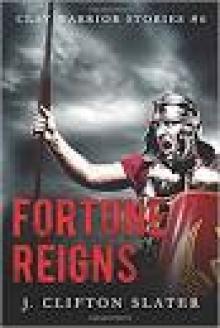 Fortune Reigns
Fortune Reigns Op File Treason
Op File Treason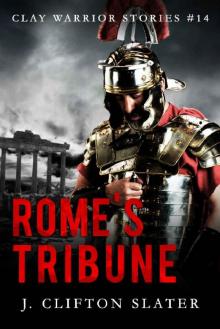 Rome's Tribune (Clay Warrior Stories Book 14)
Rome's Tribune (Clay Warrior Stories Book 14)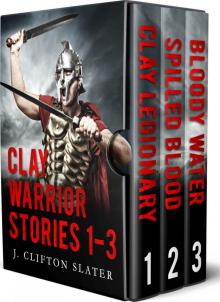 Clay Warrior Stories Boxset 1
Clay Warrior Stories Boxset 1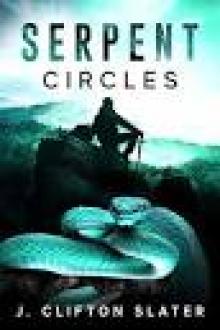 Serpent Circles
Serpent Circles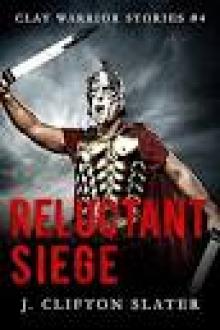 Reluctant Siege
Reluctant Siege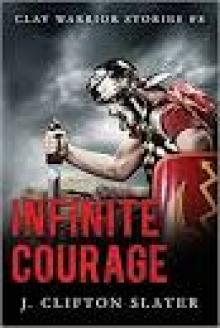 Infinite Courage
Infinite Courage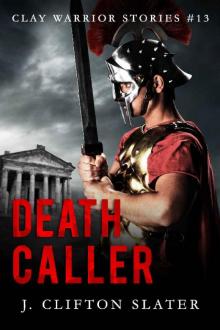 Death Caller (Clay Warrior Stories Book 13)
Death Caller (Clay Warrior Stories Book 13) Op File Sanction
Op File Sanction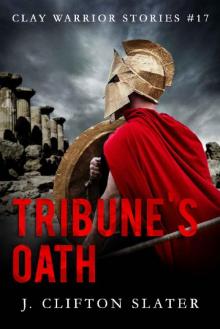 Tribune's Oath (Clay Warrior Stories Book 17)
Tribune's Oath (Clay Warrior Stories Book 17) Galactic Council Realm 1: On Station
Galactic Council Realm 1: On Station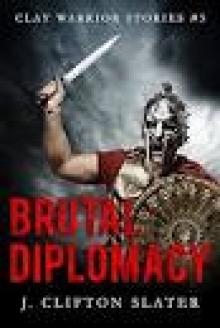 Brutal Diplomacy
Brutal Diplomacy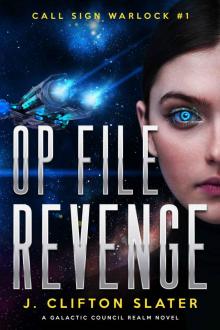 Op File Revenge
Op File Revenge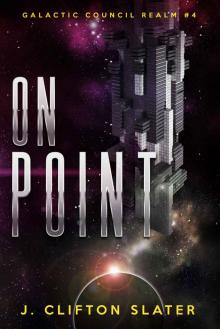 On Point
On Point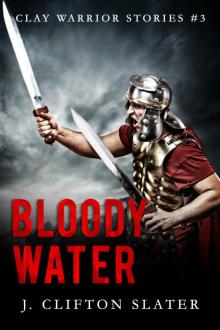 Bloody Water (Clay Warrior Stories Book 3)
Bloody Water (Clay Warrior Stories Book 3)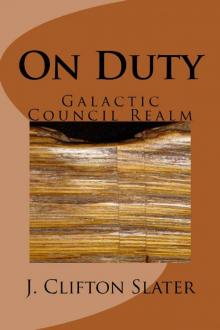 Galactic Council Realm 2: On Duty
Galactic Council Realm 2: On Duty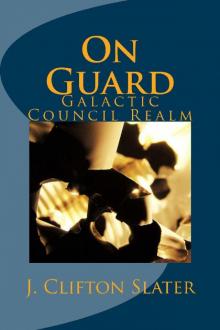 Galactic Council Realm 3: On Guard
Galactic Council Realm 3: On Guard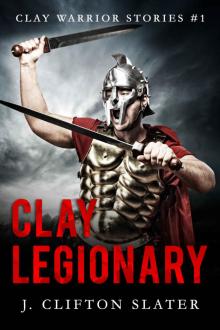 Clay Legionary (Clay Warrior Stories Book 1)
Clay Legionary (Clay Warrior Stories Book 1)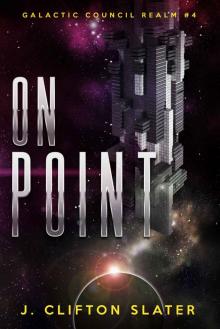 On Point (Galactic Council Realm Book 4)
On Point (Galactic Council Realm Book 4)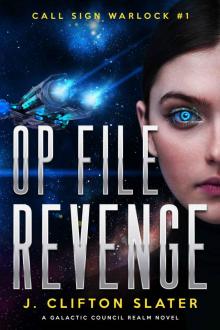 Op File Revenge (Call Sign Warlock Book 1)
Op File Revenge (Call Sign Warlock Book 1)